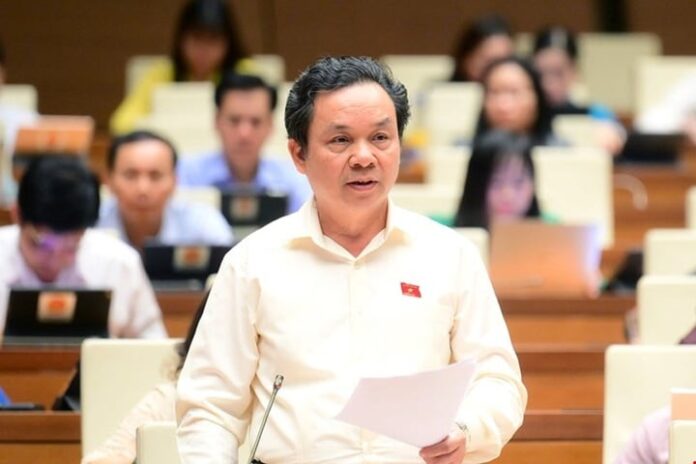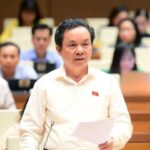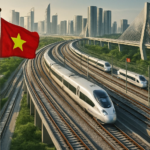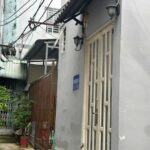During the discussion on this content, Mr. Hoang Van Cuong expressed his interest in Clause 9, Article 5 of the draft law, which stipulates import tax exemption for goods serving the railway project that cannot be produced domestically.
Mr. Cuong agreed with the regulation that assigns the Prime Minister to issue a list of goods, services, and railway industry products that will be entrusted or ordered from Vietnamese enterprises for production. To encourage these enterprises to take on the task and assure them of a stable market, we must ensure that the domestic market is reserved for these enterprises, and there should be no importation of similar products from foreign countries.
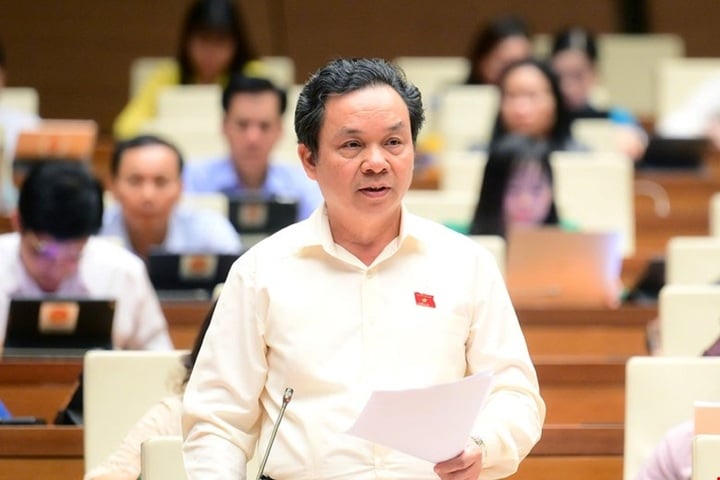
Representative Hoang Van Cuong. (Photo: National Assembly Media)
However, according to Mr. Cuong, Clause 9, Article 5, exempts import tax on goods serving the railway sector that cannot be produced domestically.
” We know that up to the present time, we do not have a railway industry, and thus, all products serving the railway industry, including those that the State plans to order from enterprises, cannot be produced domestically as of now.
If we make such a regulation, it is very likely that the domestic enterprises assigned with the task will import these products from foreign countries or even hire foreign manufacturers to produce the components while we only assemble them here. This will certainly defeat our goal of developing the railway industry, ” said Mr. Cuong.
Therefore, he proposed that there should be a regulation prohibiting the importation of goods, services, and even components for assembly into products and services included in the list of goods that the State will entrust or order from domestic organizations and enterprises for production.
Regarding the regulation encouraging organizations and individuals to invest in railway projects with non-state capital sources, Mr. Cuong considered this a very correct policy. However, Article 25 only stipulates the designation of investors for projects that the railway investors themselves propose or for projects invested in through the public-private partnership (PPP) mode.
For railway projects that the State is proposing to invest in with state capital, there is no mechanism to allow private investors to participate. For example, there is currently an investor proposing the North-South high-speed railway project, but we do not have a mechanism to allow their participation.
” Therefore, I propose that Article 25 should be supplemented with a method for selecting private investors to participate in railway projects that the State plans to invest in with state budget funds, either wholly or partially. Or it should be stipulated that the Prime Minister issues regulations on criteria for selecting private investors to invest in railway projects planned for investment with state budget funds, ” he suggested.
He also suggested selection criteria based on three principles: not changing the project’s goals and technical requirements, not increasing capital investment when there is private sector involvement compared to the State’s initial plan, and bringing higher operational efficiency to the State than if the State invested alone.
Meanwhile, delegate Trinh Xuan An (from Dong Nai province) expressed his agreement with the opinions of many delegates regarding the investors being allowed to designate contractors who can demonstrate professional capacity and capital mobilization ability. While the goal of this regulation is correct, it needs to be supplemented to ensure the financial capacity of the investors.
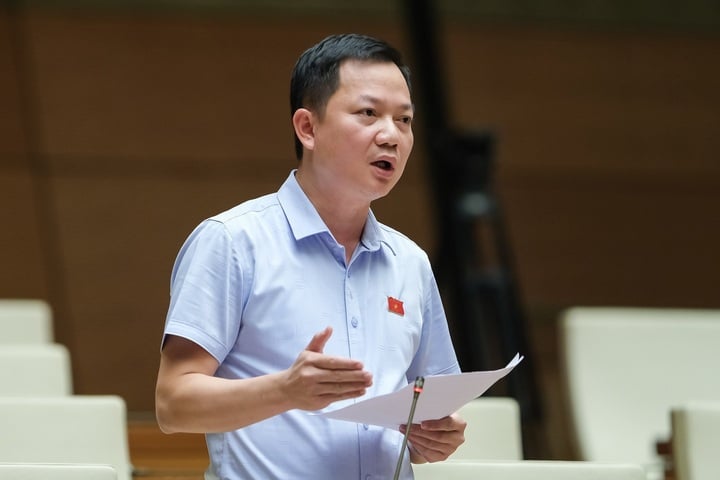
Delegate Trinh Xuan An. (Photo: National Assembly Media)
” We cannot provide a general report on ownership capital and borrowed capital. It is necessary to be more specific about the financial capacity of the investors. Recently, there was a case where an investor claimed to have $100 billion to implement a project. They sent a written document, but their proof was very vague. It is necessary to have a mechanism to evaluate, even a council to evaluate, and especially to have independent audits. There must also be cross-checking mechanisms to ensure that we have truly capable investors, ” said Mr. An.
Meanwhile, Delegate Nguyen Minh Duc (from Ho Chi Minh City) stated that, in the context that the railway sector has accounted for a very small proportion of the transport structure and has been slow to develop compared to other modes of transport for a long time, it is urgent to complete the legal corridor to unblock resources and mobilize social investment, synchronize planning, and connect economic regions.
At the same time, it is the legal basis for developing and implementing key national projects such as the North-South high-speed railway, urban railways, and railways such as Hanoi – Lao Cai, Hanoi – Hai Phong – Lang Son.
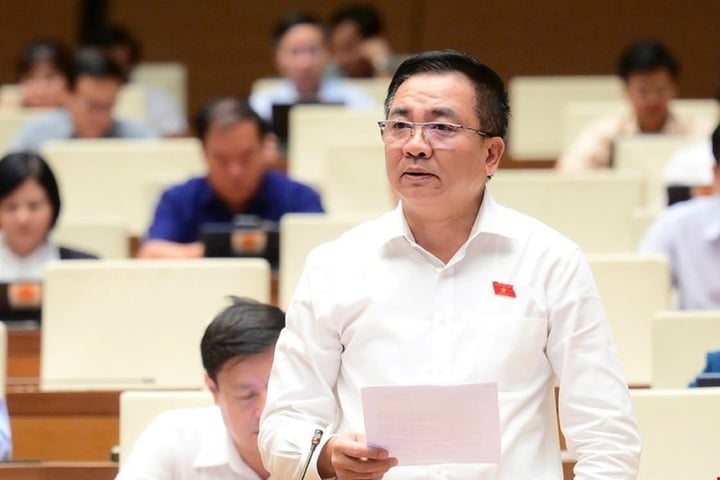
Delegate Nguyen Minh Duc. (Photo: National Assembly Media)
Mr. Duc also supported expanding the subjects and forms of investment to mobilize all economic resources, especially from the private sector, to participate in railway development. ” The involvement of the private sector in railway development has the advantage of mobilizing capital, as investing in railways requires a large amount of capital.
However, there must be very strict regulations to ensure a cautious mechanism and policy, especially regarding issues related to national defense and security, to avoid cases where projects are transferred or sold to other domestic or foreign investors, ” he added.
“In-House Innovation: Revitalizing the Railway Industry”
“Delegate Hoàng Văn Cường from the Hanoi delegation expressed his views during the discussion on the draft Law on Railways (amended) in the afternoon of June 18th.”
High-Speed North-South Railway: A $70 Billion Venture. Even with Deep Pockets, Vingroup and THACO Require Government Support for this Mega Project!
“Capital raising for this project is not just about sourcing funds, according to Nguyen Quang Thuan, Chairman of FiinGroup and FiinRatings. It also necessitates a transparent and professional implementation mechanism, as well as synchronous reforms in the capital market to attract participation from domestic individuals and enterprises, as well as international investors.”
“State-Led Development: The Case for Government-Initiated TOD Projects Along Railway Lines”
“Concerns have been raised about investors potentially proposing railway projects with the primary intent of developing Transit-Oriented Development (TOD) projects. To address this, a member of the National Assembly suggests that regulations should be enacted to ensure that any TOD components adjacent to railway projects are initially state-owned and subsequently subjected to open bidding and auction processes.”
“Vietnam’s Ministry of Industry and Trade Proposes Revision to E-Commerce Import Tax Exemption”
The Ministry of Industry and Trade has proposed a reconsideration of the exemption of import tax on goods purchased through e-commerce. This proposal aims to create a fair and competitive environment for domestic businesses and protect consumers’ rights. With the exponential growth of e-commerce, this move is a strategic step towards a sustainable digital economy.

